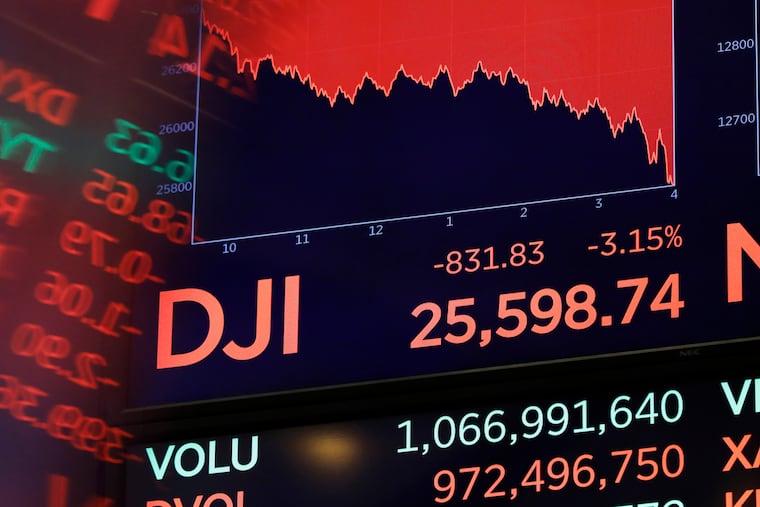Natural pullback? Stock market was overdue, money managers say
A combination of the U.S.-China trade spat, higher interest rates, lack of earnings announcements, a hurricane: All prompted the sell off.

Ouch! That was painful, but overdue.
A combination of the U.S.-China trade spat, higher interest rates, lack of earnings announcements, and a hurricane all proved convenient excuses for what is a natural, technical pullback in the stock market Wednesday, said portfolio managers in Philadelphia.
The Dow Jones Industrial average fell 832 points, or 3.2 percent, to finish at 25,599. The S&P 500 was down 3.3 percent and the Nasdaq saw the biggest losses with a decline of 4.1 percent.
"We were long overdue for a sharp decline in the markets and today we got one. Old Wall Street veterans would call these declines a 'gully wash.' Why today? There are several villains — interest rates, China, strong dollar — but mostly time. We were overdue," noted Dan Roccato, president of Quaker Wealth Management in Moorestown.
Despite minor hiccups such as in February 2018 and Wednesday's drop of more than 3 percent in the S&P 500 benchmark, U.S. equities have enjoyed a steady upward trajectory since November 2016. The technology sector — led by the FAANGs: Facebook, Amazon, Apple, Netflix, and Google — comprised most of the latest round of gains.
"Today, the technology sector took most of the loss. Healthy markets go north and south," Roccato added.
Haverford Trust co-chief investment officer Hank Smith quantified the tremendous gains in tech stocks. Taken together, Facebook, Amazon, Netflix, and Google have posted annualized returns over the last five years of more than 40 percent.
"Google is actually the laggard, at 25 percent annual returns. To expect that to continue for the next five years is just unrealistic," Smith said.
The spotlight by Congress and other regulators on the tech companies is a harbinger, he added. That type of scrutiny "can be unprofitable."
Instead, defensive sectors such as utilities and consumer cyclicals have benefited from Wednesday's sell-off, which Smith said actually began last week.
After another interest rate increase by the Federal Reserve, the 10-year Treasury bonds began selling off last week.
The median forecast of the Federal Open Market Committee officials in September called for interest rate increases to continue into 2020, rising from 3.1 percent at the end of 2019 to 3.4 percent at the end of 2020, according to the Wall Street Journal. Over the last year, the Fed has increased rates once a quarter, or a historical pace of four times annually.
"The pace of rate hikes is happening swiftly. And Fed Chairman Jerome Powell has said we may have to overshoot on the path of rate hikes, and that has spooked the stock market," Smith said.
Finally, some warnings on earnings by companies such as PP&G and Trinseo, a spin-off of Dow Chemical, prompted sell-offs in those stocks.
But the risk of a recession "over the next 12 to 15 months is still very, very low. Recessions kill bull markets. One hallmark of this almost 10-year bull market has been sell-offs like these are buying opportunities."
In the midst of the sell-off Wednesday, investors at Vanguard complained of website and phone outages, similar to what happened during other market pullbacks.
On social media sites such as Twitter, investors speculated that they were being deliberately prevented from trading.
Vanguard responded in the late morning on Wednesday, blaming connectivity issues, which continued until the closing bell.